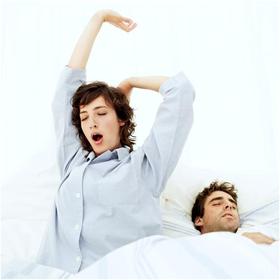
According to the Centers for Disease Control and Prevention, 50-70 million people in America are sleep deprived. Defining sleep deprivation is not always easy. Most people require, on average, at least 8 hours of sleep a night. However, some people can sleep for 8 hours or more but still have symptoms of sleep deprivation. A good night's sleep is not defined just by the amount of time spent in bed. It's also defined by the quality of sleep. Many factors can affect quality of sleep, such as noises in the bedroom, room temperature, stress, sleep apnea, pain, hormones, etc.
Sleep deprivation not only affects your energy level throughout the day it can also affect your immune system and overall health. Studies show that levels of T cells (an important part of the immune system) decrease during periods of sleep deprivation. This can potentially lead to an increase in the incidence of colds, flu and other ailments. In addition, loss of sleep leads to an increase in inflammatory markers in the body. This inflammation can lead to an increase in joint pain, heart disease, risk of stroke, chronic sinus congestion and other conditions related to inflammation.
Signs and symptoms of sleep deprivation include:
How to improve quality of sleep:
Using pharmaceutical sleep aids like Ambien, Sonata, Lunesta and Valium can lead to dependency and don't address the underlying cause of insomnia. If you are still experiencing sleep problems after using the tips in this post Dr. Peirson can help you with uncovering the ultimate cause and natural means to remedy that cause.
Sleep deprivation not only affects your energy level throughout the day it can also affect your immune system and overall health. Studies show that levels of T cells (an important part of the immune system) decrease during periods of sleep deprivation. This can potentially lead to an increase in the incidence of colds, flu and other ailments. In addition, loss of sleep leads to an increase in inflammatory markers in the body. This inflammation can lead to an increase in joint pain, heart disease, risk of stroke, chronic sinus congestion and other conditions related to inflammation.
Signs and symptoms of sleep deprivation include:
- Increased appetite and sugar cravings - Chronic loss of sleep decreases levels of leptin, a hormone that controls appetite. Sugar cravings increase as the body is looking for a secondary source of energy or quick "pick me up".
- Irritability, emotional volatility - This isn't just the occasional annoyed feeling or crying because you miss a loved one. The level of irritability and mood swings that come with sleep deprivation is long standing and felt by others around you. These feelings can also even lead to full fledged depression.
- Fatigue - You want nothing more than to lay down and do nothing. Even the smallest task is too much. You can't wait to get home so you can fall into the couch, turn on the TV and eat a frozen dinner or worse.
- Inability to cope with stress - Many people who suffer from insomnia do so because of elevated levels of cortisol, the body's major stress hormone, in the evening and at night. This leads to low levels of cortisol during the day and the inability to handle stress.
- Increased incidence of colds and flu - The body uses sleep to heal and rest. Without enough sleep the body's immune system suffers and can't effectively ward off infections.
- Poor concentration - What would normally be a simple decision can be frustrating and difficult. This can affect everything from work performance to driving safety. Reaction time is slowed during periods of sleep loss which can lead to driving accidents, not to mention falling asleep while driving.
- Socially Inept - This isn't just being introverted or shy. Unlike irritability, you're fine with everyone around you, you just can't understand them nor can they understand you.
How to improve quality of sleep:
- Sleep only when sleepy. This reduces the time you are awake in bed.
- If you can't fall asleep within 20 minutes, get up and do something boring until you feel sleepy. Sit quietly in the dark or read the warranty on your refrigerator. Don't expose yourself to bright light while you are up. The light gives cues to your brain that it is time to wake up.
- Don't take naps. This will ensure you are tired at bedtime. If you just can't make it through the day without a nap, sleep less than one hour, before 3 pm.
- Get up and go to bed the same time every day. Even on weekends! When your sleep cycle has a regular rhythm, you will feel better.
- Refrain from exercise at least 4 hours before bedtime. Regular exercise is recommended to help you sleep well, but the timing of the workout is important. Exercising in the morning or early afternoon will not interfere with sleep.
- Develop sleep rituals. It is important to give your body cues that it is time to slow down and sleep. Listen to relaxing music, read something soothing for 15 minutes, have a cup of caffeine free tea, do relaxation exercises.
- Only use your bed for sleeping. Refrain from using your bed to watch TV, paying bills, doing work or reading. So when you go to bed your body knows it is time to sleep. Sex is the only exception.
- Stay away from caffeine, nicotine and alcohol at least 4-6 hours before bed. Caffeine and nicotine are stimulants that interfere with your ability to fall asleep. Coffee, tea, cola, cocoa, chocolate and some prescription and non-prescription drugs contain caffeine. Cigarettes and some drugs contain nicotine. Alcohol may seem to help you sleep in the beginning as it slows brain activity, but it often disrupts the second half of the sleep cycle.
- Have a light snack before bed. If your stomach is too empty, that can interfere with sleep. However, if you eat a heavy meal before bedtime, that can interfere as well. Dairy products and turkey contain tryptophan, which acts as a natural sleep inducer. Tryptophan is probably why a warm glass of milk is sometimes recommended.
- Take a hot bath 90 minutes before bedtime. A hot bath will raise your body temperature, but it is the drop in body temperature that leaves you feeling sleepy.
- Make sure your bed and bedroom are quiet and comfortable. Studies indicate that people sleep better in a cooler room along with enough blankets to stay warm. If light in the early morning bothers you, get a blackout shade or wear a slumber mask. If noise bothers you, wear earplugs or get a "white noise" machine.
- Use sunlight to set your biological clock. As soon as you get up in the morning, go outside and turn your face to the sun for 15 minutes. You can also use a light box that emits 10,000 lux of light for 15 minutes every morning. Switching your alarm clock to a sunrise alarm clock will gently wake you up the way nature intended.
Using pharmaceutical sleep aids like Ambien, Sonata, Lunesta and Valium can lead to dependency and don't address the underlying cause of insomnia. If you are still experiencing sleep problems after using the tips in this post Dr. Peirson can help you with uncovering the ultimate cause and natural means to remedy that cause.


 RSS Feed
RSS Feed
